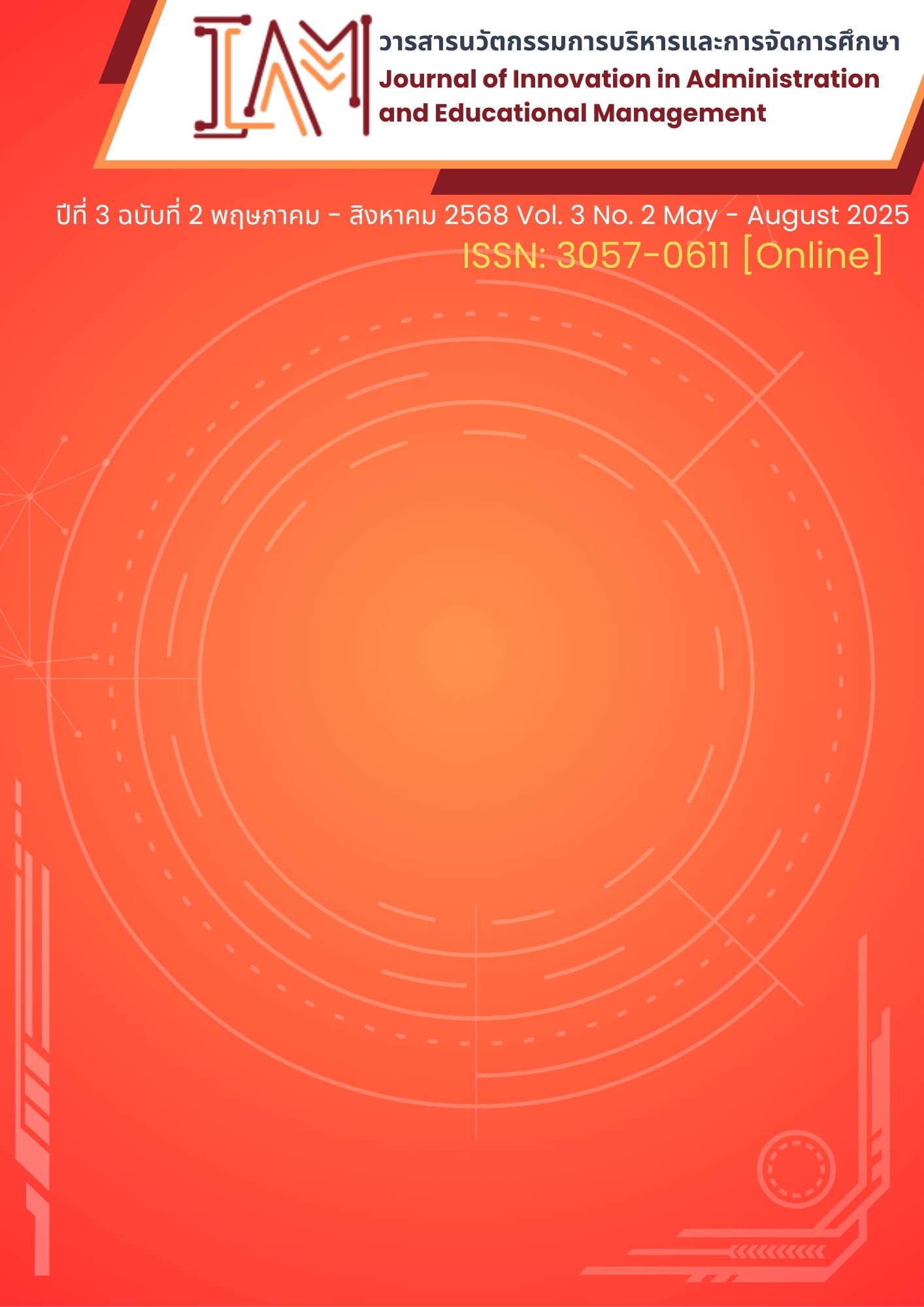Enhancing Teachers' Competency in Applying the 'Five Minds for the Future' Skills
Keywords:
Five Minds for the Future, Teacher Competency, Training Program, Local Administrative OrganizationAbstract
This study aimed to (1) enhance teachers’ competencies in applying the “Five Minds for the Future” and to (2) examine their satisfaction with the training program. The research employed a quasi-experimental design. The target group consisted of 200 teachers who voluntarily participated in a specially designed training course incorporating creative learning activities and purposeful reflective thinking. Research instruments included a competency assessment and a satisfaction questionnaire. Data were analyzed using basic statistics: mean, standard deviation, and effect size (Cohen’s d).
The findings revealed that: 1.Teachers’ competencies in the five minds significantly improved after the training. The average overall competency score increased from 2.50 (standard deviation = 0.22) before training to 4.19 (standard deviation = 0.44) after training. The most improved domain was the ethical mind (d = 1.95), followed by the respectful mind (d = 1.87) and the disciplinary mind (d = 1.66). 2.Overall satisfaction with the training was high, particularly in terms of content and applicability.
These results reflect the effectiveness of a well-structured training program in fostering teachers’ psychological competencies, aligning with Gardner’s (2006) concept of mind development through learning processes and Guskey’s (2002) framework for professional development that emphasizes measurable and sustained changes in teaching behaviors.
Downloads
References
Banks, J. A. (2019). An introduction to multicultural education (6th ed.). Pearson.
Burke, L. A., & Hutchins, H. M. (2007). Training transfer: An integrative literature review. Human Resource Development Review, 6(3), 263–296.
Cohen, J. (1988). Statistical power analysis for the behavioral sciences (2nd ed.). Hillsdale, NJ: Lawrence Erlbaum Associates.
Darling-Hammond, L. (2000). Teacher quality and student achievement: A review of state policy evidence. Educational Policy Analysis Archives, 8(1), 1-44.
Darling-Hammond, L., Flook, L., Cook-Harvey, C., Barron, B., & Osher, D. (2020). Implications for educational practice of the science of learning and development. Applied Developmental Science, 24(2), 97–140.
Deci, E. L., & Ryan, R. M. (2000). The “what” and “why” of goal pursuits: Human
needs and the self-determination of behavior. Psychological Inquiry, 11(4), 227–268.
Freeman, S., Eddy, S. L., McDonough, M., Smith, M. K., Okoroafor, N., Jordt, H., & Wenderoth, M. P. (2014). Active learning increases student performance in science, engineering, and mathematics. Proceedings of the National Academy of Sciences, 111(23), 8410–8415.
Gardner, H. (2006). Five minds for the future. Harvard Business Press.
Gardner, H. (2008). Multiple intelligences: New horizons in theory and practice. Basic Books.
Gay, G. (2018). Culturally responsive teaching: Theory, research, and practice (3rd ed.). Teachers College Press.
Guskey, T. R. (2002). Professional development and teacher change. Teachers and Teaching, 8(3), 381-391.
Heckman, K., & Best, S. (2015). Understanding the learner experience in training programs. Journal of Workplace Learning, 27(5), 355–369.
Immordino-Yang, M. H., & Damasio, A. (2007). We feel, therefore we learn: The relevance of affective and social neuroscience to education. Mind, Brain, and Education, 1(1), 3–10.
Jensen, E. (2008). Brain-based learning: The new paradigm of teaching (2nd ed.). Corwin Press.
Kolb, D. A. (1984). Experiential learning: Experience as the source of learning and development. Prentice Hall.
Korthagen, F., Kim, Y. M., & Greene, W. L. (2014). Teaching and learning from within: A core reflection approach to quality and inspiration in education. Routledge.
Ladson-Billings, G. (2021). Culturally relevant pedagogy: Asking a different question. Teachers College Record, 125(2), 1–16.
Merriam, S. B., & Bierema, L. L. (2013). Adult learning: Linking theory and practice (2nd ed.). Jossey-Bass.
Niemiec, C. P., & Ryan, R. M. (2009). Autonomy, competence, and relatedness in the classroom: Applying self-determination theory to educational practice. Theory and Research in Education, 7(2), 133–144.
Prince, M. (2014). Does active learning work? A review of the research. Journal of Engineering Education, 93(3), 223–231.
Perkins, D. (2009). Making Learning Whole: How Seven Principles of Teaching Can Transform Education. Jossey-Bass.
Perkins, D. (2010). Making learning whole: How seven principles of teaching can transform education. Jossey-Bass.
Savery, J. R. (2015). Overview of problem-based learning: Definitions and distinctions. Interdisciplinary Journal of Problem-Based Learning, 1(1), 9–20.
Sawyer, R. K. (2019). The Cambridge handbook of the learning sciences (2nd ed.). Cambridge University Press.
Sitzmann, T., & Weinhardt, J. M. (2019). Training engagement theory: A multilevel perspective on the effectiveness of work-related training. Journal of Management, 45(6), 2514–2541.
Downloads
Published
How to Cite
Issue
Section
License
Copyright (c) 2025 Journal of Innovation in Administration and Educational Management

This work is licensed under a Creative Commons Attribution-NonCommercial-NoDerivatives 4.0 International License.






